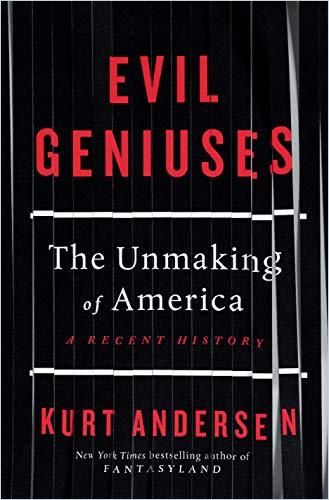Bestselling humorist and cultural commentator Kurt Andersen describes the downward arc of America’s social, economic and political circumstances with great wit and no shortage of bitterness.

What Went Wrong
This New York Times bestseller by co-founder of the legendary SPY magazine Kurt Andersen details how the United States was once the envy of the world. The “land of opportunity” was relatively egalitarian, democratic, prosperous and promising, Andersen reminds readers. But he goes on to cite America’s rising inequality, convoluted and expensive health care system, and declining competitiveness. Andersen attempts to identify where, when and how America went over the edge – and who pushed it. This entertaining and informative text is a must-read narrative of recent US history.
Walter Isaacson, author of Steve Jobs and Leonardo da Vinci, called this “the one book everyone must read as we figure out how to rebuild our country.” Ken Burns, director of The Civil War, said this “documents how history and nostalgia are engaged in hand-to-hand combat that may determine our future.” Rebecca Carol, host of the Come Through podcast, found this to be “a vivid catalog of American sociopolitical history – a dedicated deep dive into this country’s paradoxical legacy of innovation and ego, with Andersen as its clear-eyed, masterful archivist.”
American Dynamics
Andersen reminds readers that, from America’s inception, economic growth and innovation has spurred social progress, as industry and technology have created incredible wealth as well as incredible inequality.
That principle of economic fairness was at the heart of our American social contract as we evolved from rough-and-ready start-up nation to successful global superpower.Kurt Andersen
The author cites the counterbalances to US economic inequality: unions, child labor and antitrust laws, nonprofit health insurance programs like Blue Cross and Blue Shield, and Social Security. These developments, he argues, made the US economy sustainable over the long term, thus furthering innovation.
“Evil Geniuses”
Andersen details how, in the 1970s, supply-side economics allowed conservatives to argue against raising taxes; their claim was that lower taxes brought in more revenue by stimulating economic activity.
Organized labor had had its run, and now it was time for organized capital to give it a go.Kurt Andersen
Andersen discloses how conservative strategists argued for broad-based attacks on politics, academia, popular media and the legal system, and how they advocated court-packing, lobbying, and conservative media channels, universities and think tanks.
Andersen maintains that the advent of the Milton Friedman doctrine – which argued that corporations had obligations only to shareholders and to profits – ushered in a new era of corporate malfeasance and an “every-man-for-himself” mentality.
Greed
Andersen revisits how, in 1987, the dismantling of the US Federal Communications Commission’s Fairness Doctrine enabled the rise of television channels with explicitly rightist agendas, funded by conservatives like Rupert Murdoch. Andersen notes that new financial instruments began to appear, including derivatives, mortgage-backed securities and junk bonds. This financialization, Andersen argues, kick-started the decline of the pension plans that had offered security to the working and middle classes. Hedge funds serving the ultrawealthy proliferated and, Andersen discloses, the government legalized stock buybacks – a tool for inflating a company’s value. A focus on profits made corporate decision making, Andersen tells, more cynical and dehumanized, as the financial industry leached top talent from elite universities.
Greed is good meant that selfishness lost its stigma. And that was when we were in trouble.Kurt Andersen
Meanwhile, he laments, irresponsible lending increased US debt levels, and a university education’s cost started its exponential rise. America legalized gambling, and states established lotteries, which Anderson considers a regressive taxation of the poor.
Restoring Fairness
Andersen cites how literal “originalist” interpretations of the Constitution came to prominence, shepherded by judges like Robert Bork. Andersen reviles how conservatives used originalism to protect their own interests.
Running a society well and fairly requires optimizing more than maximizing, going for the greatest happiness of the greatest number and the smallest possible number being screwed.Kurt Andersen
Andersen details how America, with its skyrocketing inequality, has fallen behind other developed nations in health care, education and infrastructure. He finds that Donald Trump’s xenophobia, racism and citations of America’s past glory illuminate the power of US nostalgia and conservatism.
To restore America to fairness, Andersen suggests educating citizens about US inequality, supporting unions among the working class and in the media, dumping knee-jerk Democratic Party centrism, restoring bipartisanship, and redistributing wealth via corporate taxation or universal basic incomes.
Articulate Rage
Andersen has long been one of America’s wittiest authors and most astute observers of its social, financial, psychological and political mores. This represents not a departure for Andersen but rather a ramping up of his ever-present conscience and his outrage at the greed of conservative America. He demands, with deadly seriousness and heartfelt patriotism, change. Though always politically neutral, getAbstract.com recognizes Andersen as a brilliant, original writer and believes he will – depending on your politics – enrage or inspire you as he provides original food for thought.
Kurt Andersen also wrote Fantasyland, True Believers, Heyday, Turn of the Century and You Can’t Spell America Without Me. Related books include Anne Applebaum’s Twilight of Democracy and Daron Acemoglu and James A. Robinson’s Why Nations Fail.






